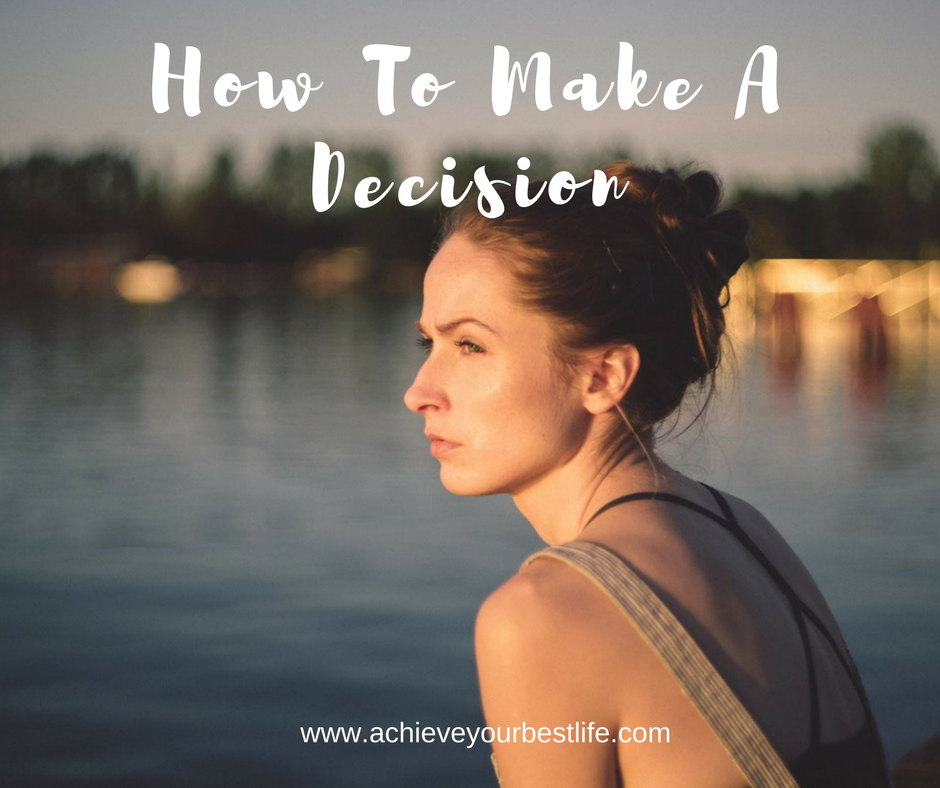
How To Make A Decision
It is in your moments of decision that your destiny is shaped.
Tony Robbins
If, as Tony Robbins puts it, we are shaping our destiny with every decision we make, then what we’re really asking is how to make a good decision. Or, at the very least, how to make better decisions.
It’s not easy, of course. There are a number of factors that can skew our judgement, play with our emotions, restrict our view of the real situation or lead us to ignore the challenge that we’re facing.
But, with those considerations in the back of our mind, let’s think about the tools we actually have to help us make better decisions.
See The Future
Or, put more precisely, see your future.
Some of the decisions we make now may have no real impact on our lives immediately, but, the future can and will be affected. Unfortunately, it’s often the little decisions that have little to no effect now that are frequently shaping our futures right under our noses.
You know this on a subtle level, even if you’re not willing to face it straightaway, because how many of us are willing to give up the little pleasures now for a better future?
As time rolls on, the need to address our previous poor decisions will become more noticeable and more pressing, so the sooner we can muster the courage to make better decisions, the more manageable our challenges.
How To Make A Decision: Relax somewhere quietly and think about your life now. Take a few moments to think about something that’s going well. Enjoy the process. Now think of something that you’d like to change because you’re not happy with your current results.
For both these examples, project yourself forward about a year and see yourself as if nothing had changed. How do you feel about what you see?
Now, change the projection to include a change that you’ve made at some point in the intervening year. What was the decision you made and what were the outcomes? Consider putting your decision into action.
Related Post: Your Future Starts Here So Make It Great!
Avoid Emotional Decisions
It’s kind of obvious that we shouldn’t make important decisions when we’re feeling upset, sad, jealous, angry etc. But how many of us are able to make that judgement call in the moment?
Firing off an angry email; shouting at your spouse; ending a relationship can all be knee-jerk decisions, fuelled by emotion that we then live to regret. Sometimes it will be possible to make amends and sometimes it won’t. But even when you can put the pieces back together, somehow they won’t fit the same.
Unfortunately there’s no easy way to overcome emotional outbursts if you’re prone to them (and most of us are to some degree).
It will take a conscious effort to change behaviour, starting with learning and understanding your triggers. From there, it’s about making a concerted effort to slow your reactions to give you just enough time to think and stop the words leaving your mouth.
How To Make A Decision: Start with awareness. When you find your emotions running away with you, the moment you catch yourself, make a conscious effort to draw a deep breath. Mentally step away from the situation, even better, walk away if you can.
Calm your emotions by reciting a soothing mantra to yourself, for example, “I am calm” or “I am quiet now” or “Humility is my strength” (sometimes it’s better to be happy than right).
As soon as you can, decide the outcome you want. Do you just want to walk away? Then do so by calmly excusing yourself. Maybe say, “Let’s take a breath” and leave the room.
Whatever the situation, the trick is to catch yourself as you hit the emotional spiral, stop the downward slide and then get back to where you want to be. Practice is the best teacher.
Related Post: Should You Control Your Reactions?
Balance or Sacrifice – The Pay Off
Decisions are never made in isolation. They will be influenced by their own set of sacrifices and the need to balance the outcome with your current lifestyle and future aspirations.
Being aware of this can help you in making better decisions, because it forces you to consider all the possible outcomes along with the ripple effect, ie, how your decision will affect those around you.
How To Make A Decision: When you need to make a decision, make a list of the pros and cons of your choice. Now, expand each of those answers by asking yourself:
What will be the knock-on effect of this? Am I happy with that?
Who will be affected by this? Am I happy with that?
Here’s a quick example:
I’ve decided to lose some weight.
Pros
I’ll feel happier
~ > I’ll be nicer to be around and my family will benefit
~~ > Yes, I’m happy with that.
My clothes will fit better
~ > I’ll probably want some new clothes because I’ll be fed up with my old clothes
~~ > This could negatively affect my bank balance (not so happy)
I’ll be fitter and healthier
~> I’ll probably want to go out more often and/or join a gym
~~ > This will affect the amount of time I spend with others, which could be positive or negative
Cons
I’ll have to restrict my food choices
~ > I’ll need to change my shopping plans
~~ > This will take time and effort. I’m always short of time.
I’ll have to take more exercise
~ > I’ll probably need to get out in all weathers.
~~ > I may need particular clothing to cope with this
I could fail
~ > I’ll be grumpy and disappointed which will affect the people around me.
~~ > I would be unhappy with myself if I reacted this way.
These can be expanded further, but the important thing is to get a feel for how the decision you’re making now can have an effect in more places than you previously thought.
Making The Wrong Decision
Have you ever refused, albeit passively, to make a decision? The chances are you have, even if it’s just the simple things like ‘what do you want to eat tonight?’ and then left it to the other person to choose the meal. There’s no real harm in this, unless you’re eating things you don’t particularly like!
But what if it’s a much bigger decision that you’re procrastinating on?
The risk of a wrong decision is preferable to the terror of indecision.
Maimonides
If you’re sticking around in a relationship that doesn’t work for you, or a job that’s less than inspiring, or sitting around waiting for your life to start, then even a wrong decision is probably preferable to doing nothing.
The thing is, by taking action – any sort of constructive action, the situation will change. Furthermore, by getting into motion, your mindset and attitude will change. You’ll feel more confident that you can make more decisions, take corrective action and move the situation and circumstances in a direction that suits your needs better.
How To Make A Decision: If you struggle to make any sort of decision, use a combination of action points 1 & 2 above. Visualise the future you want and see the actions you need to take. Next, assess those actions considering pros and cons.
Finally, take action. Find the one thing on your list that feels doable and take the action, even if it’s tiny, just get moving.
Be Your Own Advocate
Hanging back on decisions because we’re worried about what others’ will think is human nature. We seem to be hardwired to think that other people are watching our every move and that they will judge us for our choices.
Whilst some of this may be true (there are plenty of judgemental people out there!), on balance you probably don’t care what these people think, and, for other people whose opinions are important to you, they might just surprise you and be supportive of your decision.
How To Make A Decision: If you’re really worried about what people might think, write a list of those people’s names and then score their likely reaction on a scale of 1 – 10, 1 being no reaction and 10 being angry/unsupportive.
Now decide how you feel about each one. If you don’t care or you think it’s manageable, cross their name out. For those you’re left with, try talking to someone unconnected to get their view. See if the number changes.
Your Priorities or Someone Else’s?
Taking a superficial view of other people’s lives can lead us to believe that they have a wonderful, fun and balanced life, when the reality might be so much different to that!
In reality, no one really ever has a balanced life. Instead, for those who’ve managed to make a ‘success’ of their lives, they’ve had to decide, on a daily basis, to put their important priorities ahead of the drama, mini-emergencies, emotions and minutiae that comes our way every day.
If you’ve ever written a to-do list and planned out your day, then I’m sure you know that it’s a constant battle to stay on track!
How To Make A Decision: What is your main goal/priority? Write it down. Now think about all the possible interruptions, stumbling blocks and obstacles that are likely to stop you achieving your goal.
Now it’s truly up to you. Decide how badly you want the outcome. Is it strong enough for you to decide to put your needs ahead of the daily rubbish that comes your way. Really, this is your choice. Make it happen.
Final Words
Knowing how to make a decision is an important like skill. Furthermore realising that little and big decisions made now can (and probably will) have a big impact on your future if you allow them to accumulate over time.
Related Post: 5 Ways You Are Cheating Your Future Self
This will be true for both good and poor decisions. Therefore, making a conscious effort now to visualise or articulate the future you want (next month, next year, five years from now or even in retirement) and then building the (corrective) activities into your daily life will have a huge pay off.
In any event, just being prepared to make a decision, and not allowing your life to coast will help you achieve the life you want, rather than sliding into an unknown future.





[…] Read another post – How To Make A Decision > Join my free private FB Group – Click now to join my closed (private) Facebook Group […]